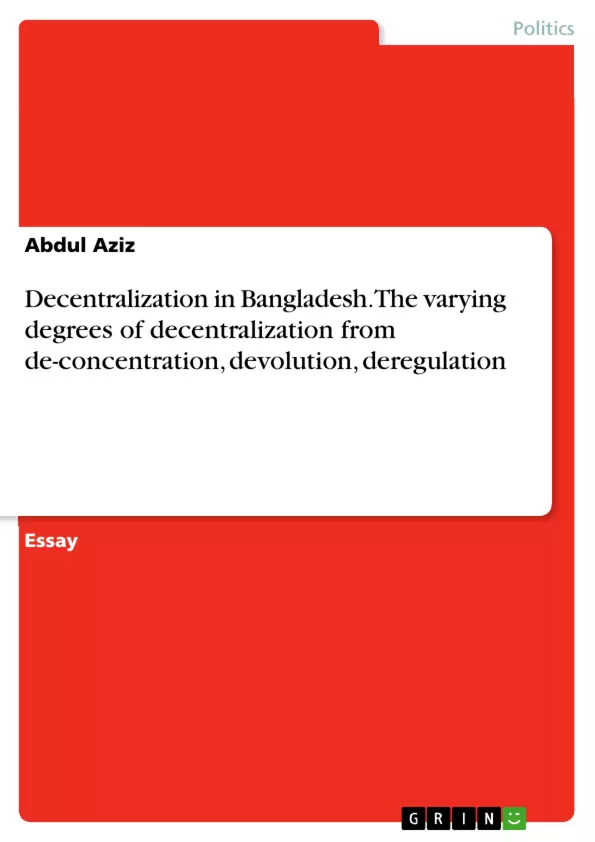The objective of the essay is to (1) examine the concept of decentralization, (2) the varying degrees of decentralization from de-concentration, devolution, deregulation and (3) the benefits and disadvantages of the process for a developing country like Bangladesh, (4) the discussion focuses on evidence from several case studies with particular reference to the Bangladesh Rural Development Board (BRDB) and how and why decentralization was implemented and how successful the process has been for the organization in its objective to reduce poverty.
Inhaltsverzeichnis (Table of Contents)
- Introduction
- What is decentralization?
- The varying degrees of decentralization
- De-concentration
- Delegation
- Devolution
- Limitations of Decentralization
- Advantages of Decentralization
- Decentralization in Bangladesh
Zielsetzung und Themenschwerpunkte (Objectives and Key Themes)
The essay examines the concept of decentralization, its varying degrees, and its benefits and disadvantages for developing countries like Bangladesh. It focuses on evidence from case studies, particularly the Bangladesh Rural Development Board (BRDB), to understand how and why decentralization was implemented and its success in reducing poverty.
- Defining and understanding decentralization
- Analyzing different levels of decentralization (de-concentration, delegation, devolution)
- Examining the advantages and disadvantages of decentralization
- Exploring the implementation and effectiveness of decentralization in Bangladesh
- Assessing the role of decentralization in poverty reduction
Zusammenfassung der Kapitel (Chapter Summaries)
- Introduction: Introduces the essay's objectives and scope, focusing on the concept of decentralization and its relevance to Bangladesh's development.
- What is decentralization?: Discusses the complex nature of decentralization and its varying definitions, emphasizing the transfer of decision-making power to lower levels.
- The varying degrees of decentralization: Explores different forms of decentralization, including de-concentration, delegation, and devolution, outlining their characteristics and differences in terms of independence and self-governance.
- Limitations of Decentralization: Examines potential drawbacks of decentralization, including coordination challenges, inconsistent service delivery, and resource constraints.
- Advantages of Decentralization: Highlights the benefits of decentralization, such as increased responsiveness to local needs, quicker decision-making, and more efficient resource allocation.
- Decentralization in Bangladesh: Analyzes the context of decentralization in Bangladesh, focusing on the challenges of bureaucratic culture, centralized authority, and widespread corruption.
Schlüsselwörter (Keywords)
Decentralization, Bangladesh, poverty reduction, rural development, BRDB, de-concentration, delegation, devolution, public sector management, accountability, participation, empowerment.
Frequently Asked Questions
What are the different degrees of decentralization?
Decentralization varies from de-concentration (shifting workload) to delegation (transferring decision-making) and devolution (granting full autonomy to local units).
What is the role of the BRDB in Bangladesh?
The Bangladesh Rural Development Board (BRDB) is a key organization involved in poverty reduction through decentralized rural development initiatives.
What are the benefits of decentralization for developing countries?
It increases responsiveness to local needs, allows for quicker decision-making, and can lead to more efficient resource allocation.
What are the main challenges of decentralization in Bangladesh?
Key challenges include a highly centralized bureaucratic culture, lack of accountability, and widespread corruption in public sector management.
How does decentralization help in poverty reduction?
By empowering local communities and involving them in decision-making, development programs can be better tailored to the specific needs of the poor.
- Citation du texte
- Abdul Aziz (Auteur), 2016, Decentralization in Bangladesh.The varying degrees of decentralization from de-concentration, devolution, deregulation, Munich, GRIN Verlag, https://www.grin.com/document/508170



